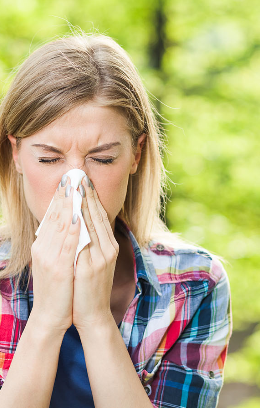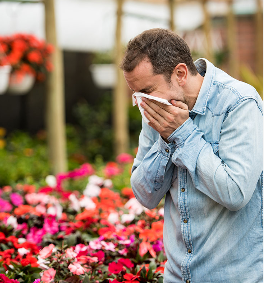
Allergies
 Allergies are the worst. You feel miserable without the excuse of being
ill. Except you are ill. Your body is over-reacting to something, causing
symptoms that feel like a cold and can be just as disruptive to your life.
Allergies are the worst. You feel miserable without the excuse of being
ill. Except you are ill. Your body is over-reacting to something, causing
symptoms that feel like a cold and can be just as disruptive to your life.
Legacy ER & Urgent Care is a fully equipped Emergency Room and Urgent Care staffed by ER-trained physicians and staff trained to treat conditions from seasonal allergies to asthma.
When to Call 911 – Anaphylaxis
Call 911 or seek immediate medical assistance in cases of anaphylactic shock, which is an extreme reaction to an allergen. Anaphylactic shock is rare, and most individuals recover. However, it can be life-threatening.
 You may experience:
You may experience:
- Hypotension – low blood pressure
- Wheezing to the point of being unable to breathe
- Loss of consciousness, fainting, or passing out
If you have an EpiPen(R), use it and have someone call for immediate emergency medical assistance. Otherwise, emergency personnel may administer a shot of epinephrine to reverse the symptoms and transport you to the emergency room for further treatment.
Common triggers include:
- Peanuts and tree nuts (walnuts, hazelnuts, cashews, pistachios, almonds, pine nuts)
- Fish and shellfish (crawfish, shrimp, lobster, crab)
- Milk, eggs, soy, wheat
- Penicillin
- Aspirin, ibuprofen, and other non-steroidal anti-inflammatory drugs (NSAIDS)
- Stings or bites from bees, wasps, yellow jackets, hornets, and fire ants
- Latex found in hospital cloves, balloons, and rubber bands
Seasonal Allergies
Most of us have experienced seasonal allergies, popularly known as hay fever. During growing seasons, plants spread pollen through the air and, when breathed in, can be considered a threat by your body, triggering an allergic reaction.
Common symptoms:
- Itchy or watery eyes
- Runny nose
- Itchy throat
- Sneezing
- Stuffy nose
- Wheezing
Some plants, such as ragweed, mountain cedar, and sagebrush, are worse than others for causing allergies. Allergies are also caused by grass pollen and tree pollen, especially birch, cedar, and oak.
Treating Your Allergies
There are many over-the-counter (OTC) remedies for controlling allergies.
- Antihistamines including diphenhydramine (Benedryl(R)), loratidine (Claritin(R)), fexofenedine (Allegra(R)), and cetirizine (Zyrtec(R))
- Nasal steroid sprays including budesonide (Rhinocort(R)), triamcinolone (Nasacort(R)) or fluticasone (Flonase(R))
- Decongestants for stuffy nose such as pseudephedrine (Sudafed(R))
- Expectorants to thin mucus such as guaifenesin (Mucinex(R))
When treating children for allergies, always follow your pediatrician’s recommendation and the directions on the medication label.
Preventing Allergies
You may not be able to prevent all allergic symptoms, but you can minimize them.
- Stay inside where it’s air-conditioned during peak pollen times, usually morning and evening.
- Take a thorough bath or shower before bedtime or right after working or playing outdoors.
- Take off your shoes when in the house.
- Keep the windows closed.
- Rinse out nasal passages with saline sprays.
Some individuals recommend using a neti pot. If you choose to go this route, ONLY use distilled or sterilized water. NEVER use tap water.
How Do You Know It Isn’t a Cold?
Allergies and colds do tend to share the same symptoms. However, if you have a cold you are more likely to have the following symptoms, along with the stuffy nose and sneezing:
- Fever
- Sore throat
- Body aches
Also, a cold lasts about seven to ten days. If you have itchy, watery eyes or eczema (a type of rash), or your nasal symptoms last for weeks, it’s probably an allergy.
Occasionally, allergies can create conditions for bacterial infections to occur, including sinus infections, conjunctivitis, or bronchitis. See your primary healthcare provider or visit Legacy ER & Urgent Care for treatment.
